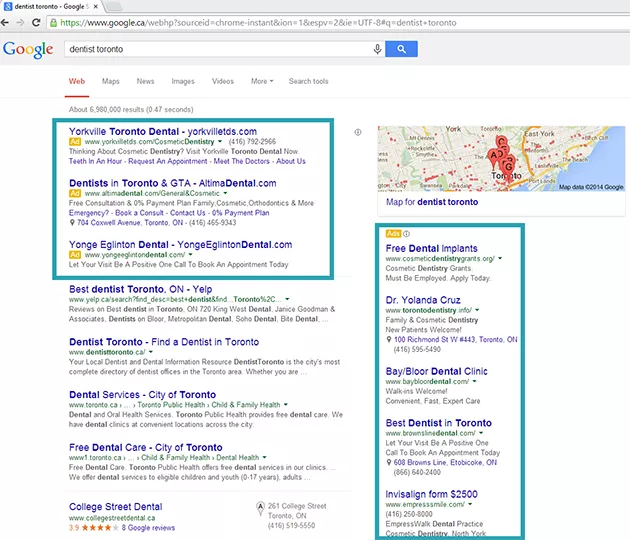Paid Search Advertising: Google Ads Basics for Dentists
What is paid search advertising? When you do a search on Google, Bing or any other search engine, paid advertisements come up with the organic search listings. In Google, these are labelled “Sponsored” – they usually take up the first three spots on the page. These are paid search advertisements.
Paid search advertisements are text-based and are triggered when you search for a particular keyword.

How does paid search work?
Google Ads is an auction. You bid to be displayed on the top spot for particular keywords, such as “Boston dentist” or “teeth whitening” so that when someone near you searches for those keywords, your ad also shows up. However, the highest bidder doesn’t necessarily get the top spot. A number of factors increase your standing in the auction after your maximum bid. Your keyword quality score, landing page and ad content influence whether your ad appears for a particular search term and how high your ad ranks for that search query. Basically, Google wants to show the most relevant ads to make sure users find what they’re looking for. Think of it this way: if you’re a dentist but you bid on the key word “flower shop,” you’re probably never going to be shown – even if you’re the highest bidder.
You can pay for the number of clicks (cost per click or CPC) or you can pay by the number of views (cost per thousand views or CPM). With cost per view, you’re paying for the number of impressions, (or number of times that your ad will show up) even if that doesn’t result in visitors to your website. We typically use cost per click ads, because you only pay when someone clicks on your ad and enters your website. We use CPM ads when we are looking to build the brand and general awareness.
You can also target your ad so that it’s only visible to people searching in your geographical area. This is particularly important to dentists, as most people visit a dentist close to their home or place of work. There’s no need to advertise to the whole state of Michigan if your dental practice is located in Ann Arbor!
Find out more here:
When should a dentist use paid search advertising?
When you have a new site: New sites don’t often shoot straight to the top of search results. Running ad campaigns for your main website pages can be helpful in the short term while you’re waiting for Google to index your website so that it shows up in organic search results.
When your site doesn’t show up in organic searches: For sites that have dropped out of the top 10 search results, paid search can be very useful. Paid search means that no matter where your website ranks organically, it will show up on the first page for potential patients.
When you are growing your practice or a particular service: Google Ads allows you to target new patients who are looking for a dentist or a particular service. By using keywords like “find dentist”, “dentist accepting patients”, or “emergency dentist”, you can target your ads to users that have high intent to book an appointment. By creating an ad campaign that captures these types of keywords it can really get your name out there in front of patients at the exact moment when they are deciding who to book an appointment with.
When you want to ensure you get the referral: Even if your site is ranking in the organic search results, you can also benefit by having an ad appear. By showing up twice you’re increasing your chances that you’ll get a click. You might wonder why you’d pay for an ad if your listing is already appearing for free – it’s because your ad will encourage the searcher to click on one or the other, and in the end you’ll end up with more traffic.
What should a dentist do with a limited advertising budget?
If your advertising budget is limited, you should pay particular attention to your conversion rates and keywords. Conversions occur when a new patient clicks on your ad and then takes a particular action (for example sending you a message through the contact us form). Run your Google Ads campaigns to optimize for conversions so that you have the best chance to get new patients. By tracking the conversion over time you will be able to focus your budget on the keywords, ads and landing pages that provide the highest results.
When starting out, you can use more keywords but over time you should pause the keywords that aren’t being shown and aren’t bringing in new patients. This improves the overall health of your Google Ads campaigns. You’ll pay less for high-performing keywords and keywords with high-quality scores, so make sure that all of your keywords are aligned with your landing page and your ads. Also if a particular keyword is bringing in unrelated traffic you can add those search terms to your negative keyword list.
You can target your geographic location and set the time of day the ads will run in order to maximize your budget.
Because of the dynamic nature of Google Ads, pay attention to how your keywords and advertisements are ranking. Don’t just launch the campaign and let it run on autopilot. Advertisers that are the most successful are constantly improving their accounts.
Conclusion
There are a lot of moving parts to Google Ads! If you’re opting to do it yourself, make sure you read all you can about how to set up and monitor your account. If you don’t have time to do that, a marketing professional can save you headaches and money in the long run – and make sure lots of new patients find you when they’re looking for a dentist.
Watch the next video in the Marketing your Practice Series: Why Use Facebook?